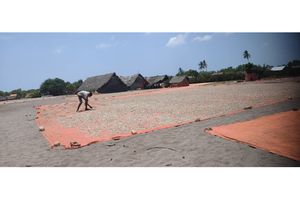Paul Makonda and the proverbial power of the tongue

The tongue is so powerful that it can make or break people.
The Holly Bible, in Proverbs 18:21 (LEB) says “Death and life [are] in the {power} of the tongue, and those who love her will eat of her fruit.”
Last week Tanzania was mourning the passing on of a great entrepreneur, Reginald Mengi. Mengi died in Dubai, United Arab Emirates on May 2 and the funeral ceremony for Dar es Salaam residents took place on May 7 at the Karimjee Hall.
Describing it as a solemn occasion is an understatement. Hundreds of people from all walks of life poured in at the Karimjee grounds to bid final farewell to the fallen popular philanthropist. As it is custom, representatives from the government, the business community, family and friends got an opportunity to pay tribute to the fallen hero.
The powerful Dar es Salaam Regional Commissioner Paul Makonda, representing city residents, also got an opportunity to pay tribute to Mengi. Makonda’s remarks were alright until he pronounced the following words;
“… I did not expect to see a Chaga giving money to a disabled. It is a very difficult thing. A Chaga donating to an orphanage, it is something difficult to explain… In Mengi we have not lost the best of all Chagas, but we have lost a Tanzanian who transcended his tribe…”
Makonda was speaking with all humility and innocence a person paying tribute to the death of a great man can muster. Just prior to making the incendiary remarks Makonda detailed how Mengi helped the city’s disabled and after the controversial remarks Makonda went ahead to narrate an example of how Mengi personally helped him to raise money for a function he held for clerics.
As expected the remarks were like a spark of fire in the bushes. It led to a huge backlash in the social media, the remaining forum for Tanzanians to anger their frustrations and air their views. It could be said, in all likelihood, that Makonda did not anticipate the reaction on his remarks to be as strong as it was.
But the backlash continued and reached its crescendo at Mengi’s final funeral ceremony in Moshi. During the ceremony the Presiding Bishop of the Evangelical Lutheran church in Tanzania Dr Fredrick Shoo, who was presiding over the Moshi ceremony, called Paul Makonda to the altar and gave him an opportunity to ‘accept reconcilliation’ after the “discriminatory” comments about the Chaga.
Makonda hesitated to go to the altar, and even when he went in front of the congregants, which included Prime Minister Kassim Majaliwa, Speaker of Parliament Job Ndugai, other dignitaries- some from outside the country- he thanked those who apoligised on his behalf but insisted that his remarks were misunderstood.
Agree with Makonda that his remarks might have been misunderstood or even taken out of context but it is also my view that Makonda failed to grasp, that day in Moshi, how powerful his tongue was as a public official.
Again it is my view that such derogative remarks were not supposed to come out of the mouth of a regional commissioner, who is a senior government official, whose duty is to bring people from various tribes and religions together for a common goal-national development.
A leader is someone who watches his tongue, and thinks before he speaks. A leader is someone who asks himself what to speak, when, where, how and why he should speak it.
Through his remarks Makonda made several mistakes. The first was an error in reasoning, called ‘fallacy of generalisation’ in logic. He generalized by inducing that the habit of stinginess of some individuals could be attributed to the whole tribe.
The second mistake was Makonda’s failure to understand and appreciate ethnic sensibilities that are still prevalent in Tanzania, especially, as it concerns the ‘big tribes’ that includes the Chaga.
Tanzania is well known for less hostile tribal relations in many aspects of life, thanks to efforts of our founding fathers. But of late, especially since the introduction of multiparty politics, ethnic tensions have resurfaced. One of the reasons why the tensions have resurfaced, usually during electoral campaigns is because politicians have the habit of using tribe as political capital. The negative side of it is that the people remain divided even after elections and this requires politicians and public officials to watch their tongues during and after elections.
Makonda must have been aware of how ethnic fissures were apparent in the last General Election and how it was somehow used to pity “those from the North against the rest of the country.”
Baraka Samson is a reporter with MCL. Email: [email protected]




